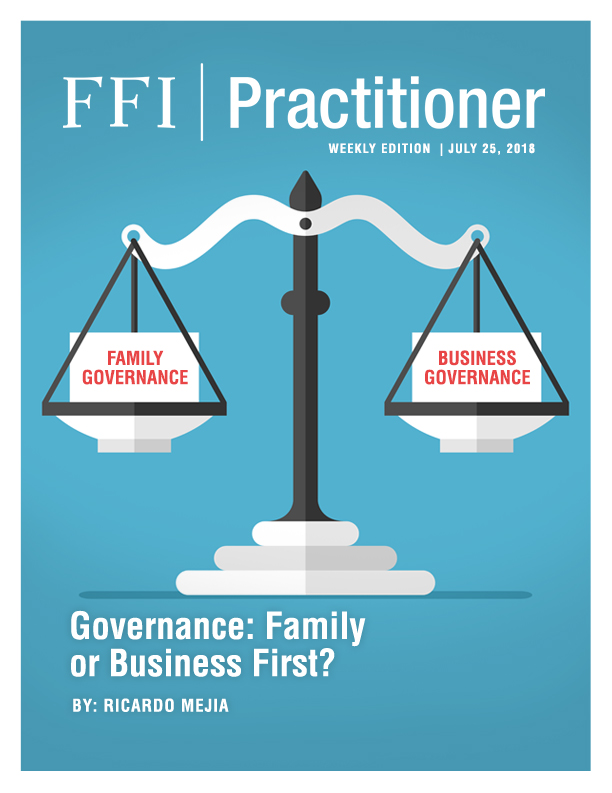Family & Business Interface
Governance: Family or Business First?
Weekly edition • July 25, 2018


From FFI Practitioner
This week’s FFI Practitioner continues our series of articles written in both English and Spanish by members of the FFI IberoAmercian Virtual Study Group. Thank you to Ricardo Mejia for sharing this case study about a client who encountered an important governance dilemma – should the owners focus on developing their corporate governance or family governance first?
In the month of June of 2016, the shareholders of Creaciones Nadar, licensee for Colombia, Ecuador, and Bolivia of the recognized international brand “Speedo,” contacted our team of experts to receive orientation on corporate governance and the family. They also inquired about how to manage the topic of succession, since the manager, who had done great work for more than 20 years, was ready to retire.
We proposed to them first to evaluate and diagnose the business with our exclusive methodology in order to create an “X-ray” of the actual situation of the company and the families.
The evaluation was performed in the months of July and August of 2016. We interviewed four shareholders, selected members of the board of directors, the manager, and four executives (two of them being members of one of the partner families) with considerable experience within the company.
Creaciones Nadar was founded in 1991 by four professionals associated with the Colombian Swimming League, once they had obtained the license for “Speedo” in the three countries. Since its founding, these professionals had acted as the only members of the board of directors. Today, the company is owned by the families of the four founders — four groups among which there is no relation.
The conclusions of the evaluation and diagnosis were presented to the partners and heirs associated with the company in September 2016. The main recommendations were as follow:
- Prioritize the reconstitution of the board of directors — a topic about which a consensus was quickly reached. The challenges of new markets, IT, diversity of channels, changes in the preferences of consumers, etc. all made it necessary to have a very professional board, with members that have considerable financial, administrative, and retail experience, and who understand the challenges of new technology. The new board must also work on the creation of a management succession plan and strive to make the board’s agenda more strategic, delegating the day-to-day operations of the management team.
- Once the new board of directors is established, its first action should be creating a shareholders’ agreement, in which a consensus must be reached regarding the following points, among others:
- With the experience of the new board of directors, agree upon the regulation of its functions.
- Training of successors.
- Agreement on the purchase-sale of shares.
- Although there is great harmony among the business-owning families, it is wise to develop a procedure for potential conflicts of interest.
- All other topics that should be addressed in the shareholders’ agreement.

In the discussion of the recommendations, an interesting debate was presented: some of the partners considered that the family governance and shareholders’ agreement should come before the governance of the business.
Due to the fact that a majority of the company’s products were imported, the devaluation of the last few years had forced the company to increase prices significantly, which, together with the stagnation of the Colombian economy, led to a decrease in sales. In the opinion of our team of experts, it was vital to inject a new mentality among the collaborators to counteract the difficult times that were affecting the country.
On the other hand, experience told us that business-owning families remain united mostly because they have one or more companies and that differences in the management of these companies are the primary source of conflict. As such, it was preferable to reach agreements on the corporate governance first and, once implemented, move on to the family government.
“In the opinion of our team of experts, it was vital to inject a new mentality among the collaborators to counteract the difficult times that were affecting the country.”
The partners finally accepted our recommendations unanimously, and in December 2016, they approved the work plan that we presented them:
Creaciones Nadar will reduce the members of the board of directors to three people: a shareholder and two new completely independent members. The board will begin its functions as an advisory board, with the commitment that once everyone is confident in the process, the board will assume all functions as agents of the corporation, with all the legal responsibilities that this implies. Our team of advisers will present various candidates for the two vacant positions and only those that have the absolute support of all shareholders will be considered for such an important commitment.
Further, the following functions were emphasized:
- Work with management to define the company strategy for the next three-five years.
- Evaluate the manager.
- Create a succession plan for the CEO, and their direct reports.
- Be familiar with the evaluations of the executives that report to the CEO.
- Review appointment and compensation of top management.
- Ensure that management is in line with the company strategy.
- Define the policies of the company.
- Approve the annual budget.
- Monitor the internal control system.
- Evaluate risks with top management.
- Establish policies regarding communication with shareholders and other stakeholders.
- Suggest to the Annual General Assembly the amount of dividends to be paid.
- Propose to the Assembly contracting limits for the CEO and the board.
Before beginning work on the shareholders’ agreement (the agreement between various unrelated shareholding families, equivalent to a protocol), a family council was formed, with two representatives from each of the four families. We invited these representatives to several board meetings so that they would be more familiar with the work and professionalism involved.
Sidebar

FFI Practitioner Article
by: Ricardo Mejia
Thanks to this week’s contributor, Ricardo Mejia of SALADEJUNTAS in Colombia for his interview with Roger Martin, director of the Martin Prosperity Institute and Thinkers50 award winner for Playing to Win: How Strategy Really Works.
The first challenge the new board faced was the search and selection of the manager. Of the final candidates presented to the board of directors, one met all of the requirements of the profile and, due to attitude, skills, and experience, this candidate was selected. However, before making the appointment official, the candidate was presented to the shareholders, who unanimously supported the decision.
I asked David Madrid, shareholder and commercial manager of the company, to evaluate whether working on the governance of the business first was positive or not. His response: “The changes that have been made to the formation of the board of directors and the manner in which it operates have been very significant and have allowed the partners and the main managers to understand the importance of these changes. Consequently, when these topics are addressed in the shareholders’ agreement, we already had knowledge and experience, which allowed us to delve much deeper during discussions about the agreement. If we had worked on the agreement before the corporate governance, the agreement would have been very superficial.”
One of the independent members of the new board is the master of economic development, Emilio Echavarría, who, after working for more than 20 years as the CEO of Valores Bancolombia, the most important stockbroker in the country, is today a recognized business adviser with ample experience with family businesses. I asked him as well if the governance of the business or of the family should come first. His response: “The appointment of a board with two independent members allowed for discussions that perhaps would not have existed previously and helped the partners and administrators to understand better the importance of the governance. Those debates were necessary for the shareholders to understand the topics related to governance and this, without a doubt, facilitated advancing the agreement among the families.”
The shareholding families of the pharmaceutical company Merck, founded 350 years ago, are aware of the importance of the business governance. All of the heirs between the ages of 15 and 21, generally between 25 and 30, meet annually and are sent to special courses related to corporate governance so that they may be prepared for their future responsibilities as shareholders. Furthermore, they are taught family principles, such as permanence, change, and growth.
“The appointment of a board with two independent members allowed for discussions that perhaps would not have existed previously and helped the partners and administrators to understand better the importance of the governance.”
– Emilio Echavarría
The first concept: study and conserve the values of the founders, work hard and honestly; the second: be open to new technologies and research; and the third: search for new markets, new business, and new products. It should come as no surprise that with these policies, the business has been expanding for 350 years and ownership has been maintained by the founding family.
In the author’s opinion, the majority of family protocols in Latin America do not meet the expectations of the families, due to the families’ lack of awareness of the importance of the corporate governance and the lack of governance in the business.
Those interested can access the interviews with Emilio Echavarría and David Madrid at: http://sdj.com.co/caso-estudio-la-transformacion-los-licenciatarios-speedo-colombia-ecuador-bolivia/
About the contributors

Ricardo Mejia, CFBA, CFWA, is a former FFI board member. After a long career as manager in public and family owned companies, he developed a vast experience in corporate governance, strategy, and KPI management. He has been professor in the Top Management Program at Universidad de Los Andes and Universidad EAFIT, is a contributor to several Colombian newspapers and is frequently invited as lecturer in national forums. Ricardo can be reached at ricardom@sdj.com.co.
About SALADEJUNTAS
SALADEJUNTAS is a boutique consulting firm, specialized in corporate governance. The company works with shareholders (of public, private and family owned companies), the board of directors and the executive team, so that they learn and respect the functions that each one must accomplish. Help is also offered in the development of the shareholders’ strategy and the corporation’s strategy and make sure that all share and support the strategic objectives.
Related Articles
If you enjoyed this article, view the related articles that discuss how complex the decision-making process within a family business can be and how the best candidates will look for the best practices both within company governance and within the search process.

